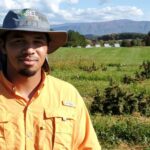
Julian Cosner, a doctoral candidate in the Department of Entomology and Plant Pathology, is featured in the 2022 Spring issue of Our Tennessee. In the article “Nipping it in the…

Julian Cosner, a doctoral candidate in the Department of Entomology and Plant Pathology, is featured in the 2022 Spring issue of Our Tennessee. In the article “Nipping it in the…